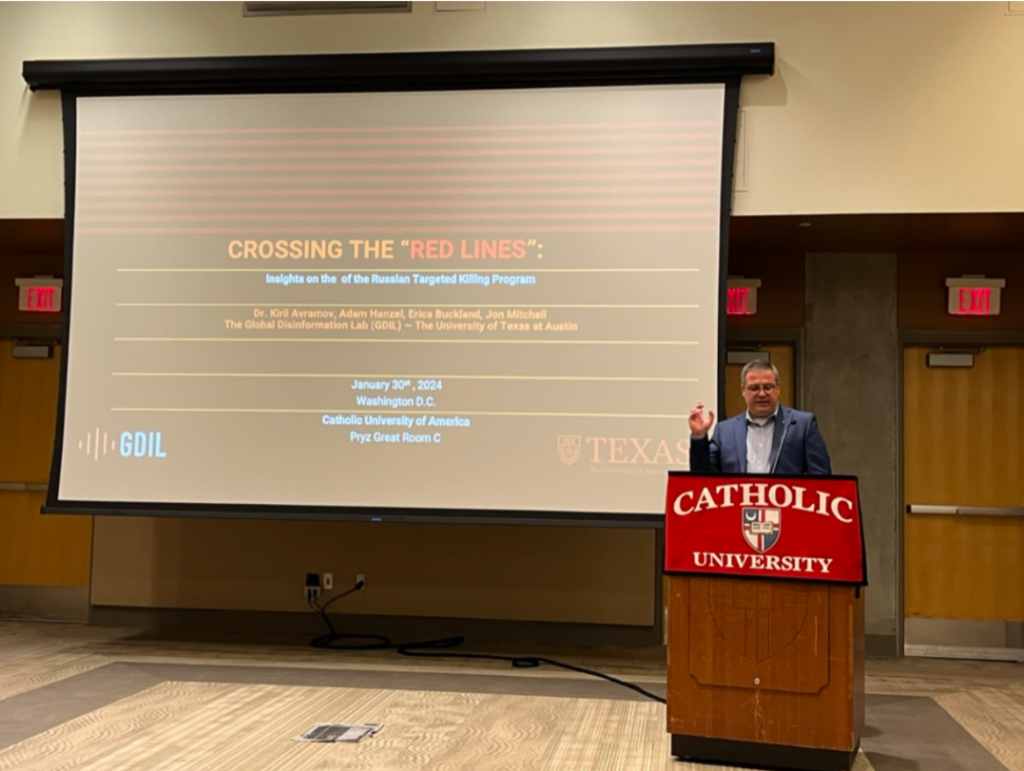Expert Sheds Light on Russian Assassinations in Campus Lecture

Photo courtesy Patrick D. Lewis
By Patrick D. Lewis
In 2020, news broke that Alexey Navalny, a Russian opposition politician and outspoken critic of Russian President Vladimir Putin, had been near-fatally poisoned with a chemical known as a nerve agent. The incident drew widespread condemnation at the time and brought other deaths, suspected to have happened at the hands of Russian government officials, to light.
These other well-known incidents are just the tip of the iceberg. Dr. Kiril Avramov, Co-Director of the Global Disinformation Lab (GDIL) and Assistant Professor at the University of Texas at Austin, has made it his mission to identify and track killings that might be connected to what he calls the “Russian Targeted Killing Program.”
On January 30, Dr. Avramov spoke to Catholic University (CUA) students at a lecture hosted by the CUA Intelligence Club, and he explained his work, how it is accomplished, the role artificial intelligence (AI) plays in it, and why the work he does is important.
“This is not only important for Russia, but for everyone else,” Dr. Avramov said. “I think it’s really important in this current context.”
Dr. Avramov explained that unlike most other government-sponsored assassinations, Russian killings are mainly directed at Russian citizens, specifically people who Putin sees as a threat to his own regime and to the stability of his country. Another unique characteristic of their assassinations is the aim of the murders. Dr. Avramov believes they are meant to rid Putin of someone he sees as hostile or potentially hostile. Historically, assassinations, especially assassination programs, have tended to serve more as messages to people who might think about retaliating against a dictator rather than as a weapon against actual threats.
With at least the unofficial approval of Putin, he and his team have identified and investigated well over 100 deaths that the GDIL team believes were carried out by Russian government agencies and their associates. The killings have targeted a range of people from different demographics, but the majority of victims are Russian men in their 30s and 40s.
The method of assassination also varies, including bombings, shootings, stabbings, stranglings, and blunt force impact. The most common method is poison, a tool that has been historically used for killings in Russia going back hundreds of years, but that is seen as bizarre and foreign in Western eyes. The poison used in killings is not an ordinary chemical with adverse medical effects. Instead, state-run laboratories, staffed by scientists, engineers, doctors, and other experts, spend a massive amount of time and money researching and producing chemical agents that work quickly, fatally, and most importantly, without leaving behind a trace that investigators might find during an autopsy. Most of the poisons are engineered to make a death look like it was a result of a heart attack or other natural cause.
AI has been a helpful resource in collecting and analyzing the data that the team acquires. “The question of attribution is key,” said Dr. Avramov. GDIL “provides an opportunity for people from different backgrounds to look at the same problem.”
As part of the work at GDIL, Dr. Avramov and the team use AI to help them search through huge troves of data they collect.
Dr. Bianca Adair, Assistant Professor in the CUA Department of Politics, Director of the Intelligence Studies Program, and faculty advisor for the Intelligence Club, explained, “AI is a tool that allows you to take vast data and make sense of it.”
Dr. Adair said that Dr. Avramov’s work is not just academic. “ODNI [Office of the Director of National Intelligence] follows his findings that comes from his lab.”
She also stressed the importance of tracking these kinds of incidents.
“We [the US intelligence community] work very hard to warn people if they are going to be killed… it’s part of an IC directive,” Dr. Adair said. “We are required to warn people when there is going to be bodily harm.”
Dr. Avramov also studies the killings because they are part of what he calls “para-politics,” which are covert and non-traditional actions that are part of a political strategy. Therefore it is important for people, especially those with an interest in politics, to understand issues like this one. Russia is an important player on the world stage, and so understanding how its leadership operates and stays in power is of interest.






